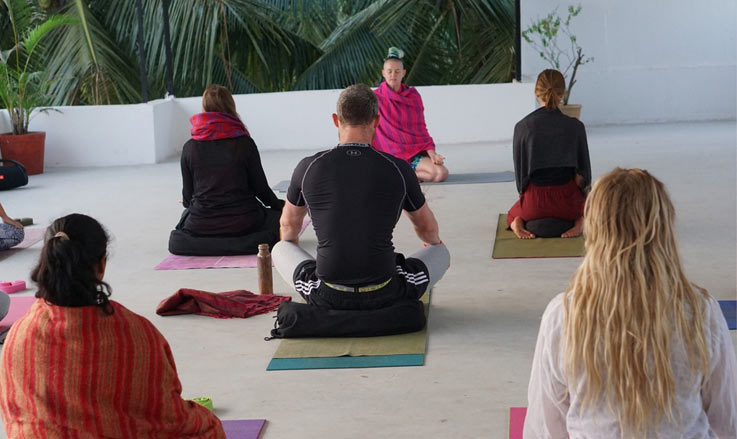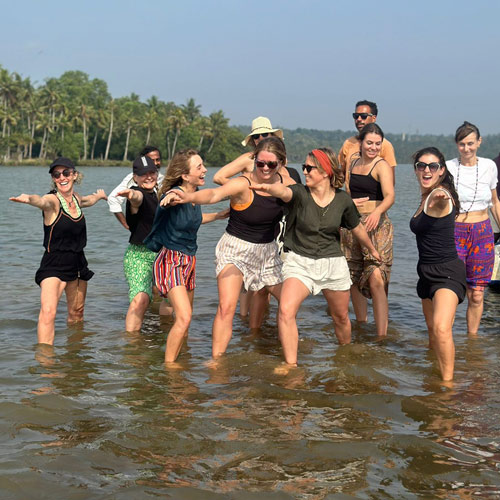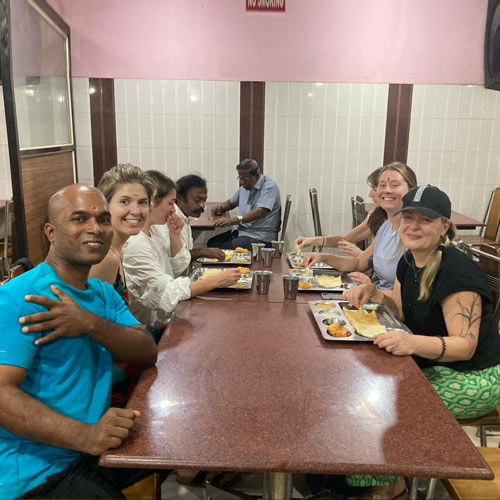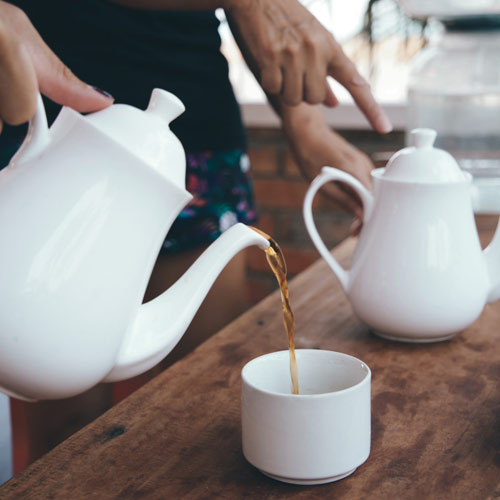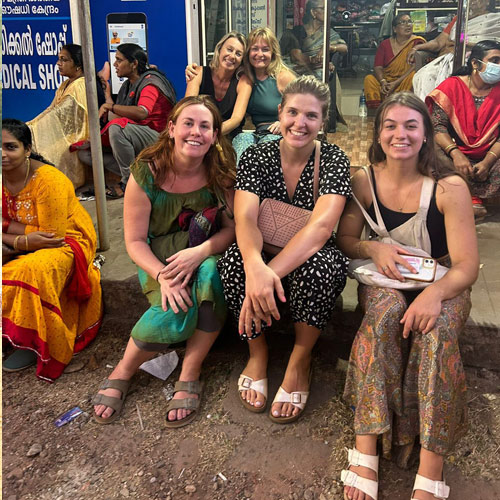Embarking on a Kerala yoga teacher training (YTT) program is a transformative journey, offering deep immersion into the practice and philosophy of yoga. Building a supportive community during this time can greatly enhance your experience. Through a yoga community, emotional bonds are likely to develop that help fostering personal growth, and keep you motivated to complete the YTT program with devotion.
Here’s a detailed guide on how to create a supportive community during your yoga teacher training in Kerala.
1. Be Open and Approachable
Creating a supportive community during a Kerala Yoga Teacher Training starts with being open and approachable. This sets the tone for positive interactions and fosters trust.
Tips
- Smile and Greet: A simple smile and a friendly greeting can go a long way in making connections.
- Body Language: Maintain open body language by facing people when you speak and avoiding crossed arms.
- Active Listening: Show genuine interest in others by listening actively, making eye contact, and asking thoughtful questions.
2. Participate in Group Activities
Group activities are a cornerstone of YTT programs, providing opportunities to bond with fellow trainees.
Tips
- Join Group Discussions: Actively participate in group discussions and share your thoughts and experiences.
- Attend Social Events: Take part in social events and extracurricular activities organised by the training center.
- Practice Together: Engage in group practice sessions, which can help build camaraderie and mutual support.
3. Share Your Journey
Sharing your personal journey can help others feel connected and understood, fostering a sense of community.
Tips
- Be Authentic: Share your challenges, successes, and insights honestly and openly.
- Encourage Others: Encourage others to share their stories and listen with empathy and without judgment.
- Create a Support Group: Form small support groups where trainees can discuss their experiences and support each other.
4. Offer and Seek Help
Offering and seeking help strengthens bonds and creates a supportive environment where everyone feels valued.
Tips
- Offer Assistance: If you see someone struggling with a pose or concept, offer your assistance and support.
- Ask for Help: Don’t hesitate to ask for help when you need it. This shows vulnerability and builds trust.
- Collaborate on Projects: Collaborate on assignments or practice teaching sessions to learn from each other and build teamwork.
5. Respect Differences
Respecting differences in backgrounds, beliefs, and experiences is crucial for building an inclusive community.
Tips
- Cultural Sensitivity: Be aware of and respect cultural differences, especially when practicing in a diverse setting like Kerala.
- Non-Judgmental Attitude: Approach differences with curiosity rather than judgment, and be open to learning from others’ perspectives.
- Inclusive Language: Use inclusive language that respects all individuals and avoids assumptions.
6. Create a Safe Space
Creating a safe space where everyone feels comfortable expressing themselves is key to a supportive community.
Tips
- Set Ground Rules: Establish ground rules for group interactions, such as confidentiality and respectful communication.
- Encourage Inclusivity: Ensure that everyone has a chance to speak and participate, and discourage cliques or exclusion.
- Provide Emotional Support: Be there for each other emotionally, offering a listening ear and compassionate support.
7. Engage with Local Culture
Engaging with the local culture can enrich your experience and help build connections within and outside the YTT community.
Tips
- Explore Together: Explore local sites, participate in cultural activities, and enjoy local cuisine with fellow trainees.
- Learn from Locals: Engage with local teachers and residents to gain insights into Kerala’s rich cultural heritage.
- Respect Local Customs: Show respect for local customs and traditions, which can help you build positive relationships with the local community.
8. Maintain Communication
Effective communication is essential for building and maintaining a supportive community.
Tips
- Regular Check-ins: Schedule regular check-ins with your peers to discuss progress, challenges, and support each other.
- Open Dialogue: Foster an environment of open dialogue where everyone feels comfortable sharing their thoughts and concerns.
- Feedback: Give and receive constructive feedback to help each other grow and improve.
9. Practice Compassion and Kindness
Compassion and kindness are the foundation of a supportive community during your Kerala Yoga Teacher Training. Be vigilant of the same and engage in positive interactions with mutual respect.
Tips
- Kind Gestures: Small acts of kindness, such as offering a compliment or helping with a task, can strengthen bonds.
- Empathy: Practice empathy by putting yourself in others’ shoes and understanding their perspectives and feelings.
- Supportive Environment: Create a supportive environment by celebrating each other’s achievements and providing encouragement.
10. Stay Connected After Training
Maintaining connections after the Kerala Yoga Teacher Training program helps sustain the supportive community you’ve built.
Tips
- Stay in Touch: Use social media, email, or messaging apps to stay in touch with your fellow trainees.
- Regular Meet-ups: Plan regular meet-ups or virtual gatherings to catch up and continue supporting each other.
- Continued Learning: Encourage continued learning and practice together, sharing new insights and experiences.
Packing Essentials for a Comfortable Kerala Yoga Teacher Training Experience
To support your Kerala YTT journey, having the right essentials can make a significant difference in your comfort and overall experience:
1. Yoga Gear
- Yoga Mat: A high-quality, non-slip mat made from sturdy material that is easy to fold and carry. .
- Yoga Clothes: Comfortable, breathable, tropic-friendly yoga clothes.
- Props: Lightweight props like a strap and a block.
2. Comfortable Clothing
- Casual Wear: Loose-fitting clothes for downtime.
- Warm Layers: Light sweater or shawl for cooler evenings.
- Rain Gear: Waterproof jacket and umbrella for the monsoon season.
3. Footwear
- Comfortable Shoes: Walking shoes or sandals for exploring when you have day offs.
- Flip-Flops: For quick trips to the bathroom or shower.
4. Personal Care Items
- Toiletries: Carry your own toiletries, pack eco-friendly and biodegradable products to keep in sync with the rest of the community at the school as most yogis and yognis prefer to experience the entire yogic experience and which means, they go for products, meals, gear, etc. that are eco-friendly.
- Sunscreen and Bug Spray: Protect against sunburn and insects.
- First Aid Kit: Include personal medications and basic first aid supplies.
5. Health and Wellness Items
- Reusable Water Bottle: Owing to the humid weather of Kerala, staying hydrated is crucial. It is recommended that you carry reusable water bottle with you at all times.
- Healthy Snacks: The Kerala YTT program can be quite demanding. Hence, keep nuts, dried fruits, and energy bars for quick energy boosts.
6. Electronics
- Phone and Charger: So you can stay connected with loved ones.
- Adapters and Converters: India uses Type C, D, and M plugs. Make sure to bring these socket-friendly gadgets or convertors.
7. Documents and Money
- Passport and Visa: Make sure all your documents are upto date, especially visa and passport.
- Travel Insurance: Carry health, accidents, and trip cancellation documents with you for in case of an emergency.
- Cash and Cards: Carry enough local currency for small purchases as various places might not have electronic payment policy. Although, a good thing to note about India is that even a vegetable hawker carries UPI payment facility. However, it is always recommended to carry cash instead.
8. Study Materials
- Notebook and Pen: A notebook and pen come in handy for taking notes during lectures.
- Yoga Texts: Carry recommended texts like the “Yoga Sutras of Patanjali” with you so you can keep referring from it during the program for a deeper understanding of the art.
9. Miscellaneous
- Small Backpack: Ideal for day trips and excursions, outdoor yoga sessions, or for those mini walks by the beach etc.
- Laundry Bag: Keep dirty laundry neatly placed in a laundry bag to keep things organised and to maintain hygiene as well.
With these tips and a positive and inclusive attitude, you can create and nurture a supportive community during your Kerala yoga teacher training journey. This supportive network will enhance your learning experience and provide a foundation for personal and professional growth long after the training ends.


